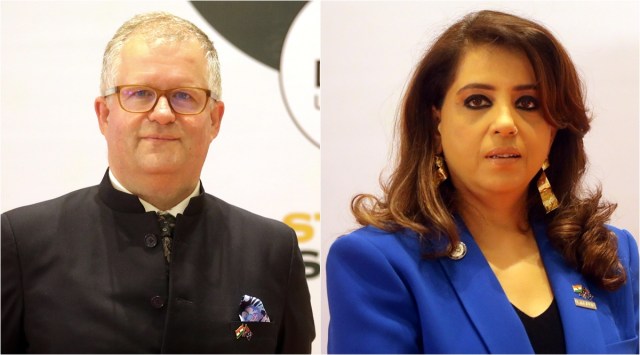‘GIFT City will be part of Deakin community, students will be globally employable’: VC
Deakin University, Australia, Vice-Chancellor Prof Iain Martin and its Vice President (Global Alliances) and CEO (South Asia), Ravneet Pawha, spoke to The Indian Express on it becoming the first foreign varsity to set up a campus in India through the GIFT City route.
 Prof Iain Martin (L), Ravneet Pawha
Prof Iain Martin (L), Ravneet PawhaDeakin University, Australia, Vice-Chancellor Prof Iain Martin and its Vice President (Global Alliances) and CEO (South Asia), Ravneet Pawha, spoke to The Indian Express on it becoming the first foreign varsity to set up a campus in India through the GIFT City route. Edited excerpts:
This would be the first off-shore branch campus of Deakin University. Why India?
Iain Martin: If we were going to do it in any country, for Deakin University, it would be India. We have been here for the last 30 years. We would only consider setting up an off-shore campus where we have the depth of relationship and are confident of the expertise and the understanding of local knowledge to make it work. Prime Minister [Narendra] Modi had clear expectations about the importance of education transformation for India, but this was a big task, and we knew the willingness was there. However, we did not see the speed with which some of these changes would happen. Towards the end of last year, as we were coming out of Covid, people were travelling again, and the economy was rebounding, it became very clear to us that we should very seriously consider as the next stage of our India strategy. We had two options — should we work with GIFT City on what was available now, or wait till 2023-24 when the new (UGC) regulations are announced for the rest of India? We decided to go with GIFT City to put ourselves in a leadership position.
Ravneet Pahwa: We have students from countries worldwide, and India is a very significant source for that. Many members of our alumni are back here working in senior positions. Our Australian students visit India regularly, and we also have commercial partners and government projects. The next step had to be significant to define our next 30 years of engagement in India. India has now opened up, and the ease of business is happening, and our experience with GIFT has been fantastic. This is going to be our next step.
China started wooing foreign universities much before India. Why did Deakin choose India for its first off-shore campus and not China?
Pahwa: We have partnerships in China, but our relationship with India is much longer and stronger on the ground. So, the comfort of knowing how to do business in India was one reason.
Martin: The other reason for me is the firm insistence by the Indian side that these degrees should be the same as we are offering in Australia. On one level, that puts a constraint on us, but on another, it makes things easier. These programmes exist and have quality assured and links to reputation already. We know how to deliver them. Indians are about 40 per cent of our international students, and China would be about 20 per cent. Why not China? Our understanding and engagement in India are much deeper than in any other country. The surprise for me is not that we are here. I am surprised we are here in 2023 and not a few years later.
Were Australia’s strained ties with China and the Covid19 pandemic also a factor in Deakin’s decision to choose India for its first off-shore campus?
Pahwa: Universities can’t establish campuses in every country they get students from. If Deakin has to do it, India would be the obvious choice.
When will your India campus start operations?
Pahwa: Latest would be July 2024.
Have you finalised the campus site?
Pahwa: We are almost finalising that option. We are currently looking at about 25,000 square feet of area to get started. The building will come up in the next couple of months.
How many students will Deakin’s India campus admit in its first year?
Martin: We will start with two Master’s programmes in business analytics and cyber. The plan is 50 to 60 students in each programme for the first intake, so around 100 students a year.
Will the faculty be sourced from Australia or hired here?
Martin: It will be a combination of both — 80 per cent local and 20 per cent coming from Deakin. We will start hiring later this year. The teachers hired locally will be considered part of their respective academic schools at Deakin in Australia. These teachers will have the opportunity to travel to Australia every 12 to 18 months. So, they will be locally employed, but will be very much part of the Deakin ecosystem. We don’t want to see this (GIFT City campus) completely separate from Deakin. We already have five campuses (in Australia); this becomes another campus in the Deakin community.
In that case, will students in the GIFT City campus also have the opportunity to visit Australia?
VC: Students will have the opportunity to study at the Deakin campus in Australia for a semester. They would have the best of both worlds — there will be face-to-face teaching, but they will also have the support of online (teaching).
There have been apprehensions about the fee foreign universities will charge in India…
Martin: We are in the process of finalising our fee structure. It will be very much less than studying the same or an equivalent degree in Australia. I think we should be able to finalise that over the next month or so. But it’ll be a really good deal for Indian students to study in India, for sure.
Why would an Indian student, for whom immigration and the lure of gaining work experience abroad is a big incentive, stay back to enrol in your campus here?
Martin: Our understanding and a little bit of research show that a cohort of students who have decided to invest financially and personally to move to Australia will continue to do that. But we also think there is a group of students who, either for economic or family reasons, would like to get a Deakin qualification but don’t want to study (in Australia). The GIFT City campus is a good option for them. Although we want the majority of GIFT City students to stay here and complete their degree because of the way we are structuring the programmes, the student can go to Australia for a trimester or a year.
Pahwa: The students who pursue a Deakin degree in India are, first, globally employable. Second, they are employable within India for sure. Third, if they choose to come to Australia, we are looking at a highly skilled migration flow from India. So, these students will rate high with a Deakin qualification.
Will there be something new for students here?
Martin: The regulations are very clear. It has to be the same. But the programmes will have an Indian flavour. We are currently working closely with Tata Consultancy Services, Infosys, HSBC and Xebia to help enrich our curriculum with real case studies. So, the plan is to work very closely with the industry.
One big issue in India has always been that we produce a lot of graduates, but only some are employable. So, this model will also help build an industry-academia connection so that the industry can depend on what we teach. But the educational structure, curriculum, evaluation, and the assessments will be the same as Australian students.
First, we’re focussing on admitting Indian students to the GIFT City campus, but there is a desire to get international students to study here. We’re not going to start with that immediately, but certainly at some point in the future.



- 01
- 02
- 03
- 04
- 05



























